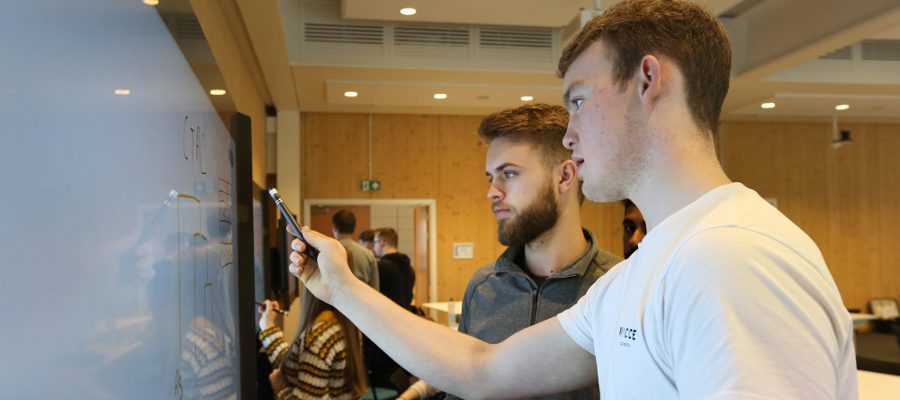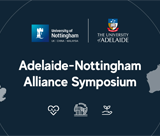
Students go digital as new technology transforms teaching
March 6th, 2019
Students in the School of Geography have piloted Microsoft Surface Hubs for group work during Dr Adam Algar’s class on Patterns of Life.
The Teaching and Learning Building has been fitted with 38 Microsoft Surface Hubs to prompt greater collaboration and new ways of working for students. All teaching rooms in the building are equipped with a Surface Hub and a further nine are in student group study rooms, eight are in student breakout sessions and the remaining two will be sent to the Digital Solutions Hub in early March.
The hubs include cutting edge interactive whiteboards that enable connecting, collaborating, curating content, sharing and recording of work. This feeds into the University’s vision for teaching, facilitating new ways of learning while also widening students’ digital skills – preparing them for life after university.
For one lesson students were asked to find, interpret and summarise a scientific article on speciation rates. Traditionally this would have involved groups splitting up the task, working on individual computers, combining the work and presenting it at the end of the lesson. Using the Surface Hubs students were able to collaborate and interact on a single device throughout, sharing ideas, curating content from the internet, challenging and editing each other’s work and recording the process for reflection and submission at the end of the lesson.
Dr Algar said: “It was possibly the most rewarding bit of teaching I’ve done with a class of 50 students. Rather than having students all working on their own screens and then producing a power point presentation this seemed so much more interactive. Students were moving things around on the screens, asking questions, challenging each other. Now I’ve seen how this can work I’m considering how I use this for other lessons and modules.”
Second-year students Kiera Pullen and Jack Richardson said they enjoyed using the Surface Hubs.
Keira said: “The surface hubs are a great way of visually representing everything you’ve learnt during the lecture, and the opportunity to work in small groups gives me the confidence to contribute and challenge ideas adding a depth to my study that I find really engaging and useful.”
Jack added: “Particularly for kinaesthetic and visual learners, working in a hands-on way helps to engage more with the task and learn from each other. Ultimately, the Hubs allow us to take the lead and explore topics in a different way to normal lectures.”
Dr Nick Mount is Digital Learning Director for the Faculty of Social Sciences. He said that digital investment is key to providing opportunities for students to build their knowledge and skills through collaboration. Dr Mount has introduced ‘bacon and tech’ sessions – breakfast training events – to enable his faculty to learn more about the potential of the hubs.
Tags: Dr Adam Algar, Interactive whiteboards, Microsoft Surface Hubs, Teaching and Learning Building
Leave a Reply
Other
Trusted Research update: changes to technologies requiring an export control licence
The UK Government has issued an updated UK Strategic Control List, introducing additional export control measures […]

Adelaide-Nottingham Alliance: join Vice-Chancellors at event celebrating global partnership
Staff, students and researchers are invited to join the Vice-Chancellors of the University of Nottingham and […]

